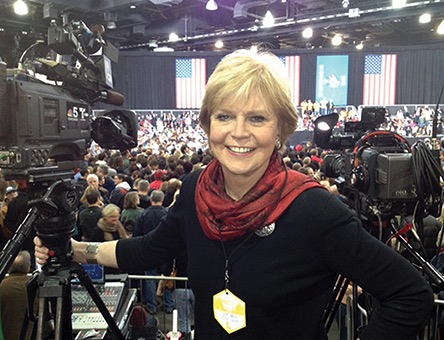The Five Spot: Carol Marin

The smarter way to stay on top of broadcasting and cable industry. Sign up below
You are now subscribed
Your newsletter sign-up was successful
Carol Marin, the consummate Chicago journalist, says she’s good with local TV, as long as it gets it right most of the time. “I have to be at least 51% proud of what we’re doing,” she says. Marin says she believes NBC-owned WMAQ Chicago, where she is currently political editor, is functioning above that threshold. Which is why Marin has returned to local TV despite famously quitting in 1997 after the O&O hired Jerry Springer to do newscast commentary—and then pursuing a career with CBS News and making documentaries. In May, Marin and her longtime producer, Don Moseley, were awarded a Peabody for their ongoing investigation into the 2014 shooting of 17-year-old Laquan McDonald by a Chicago cop. They also codirect DePaul University’s Center for Journalism Integrity & Excellence. An edited transcript of Marin’s conversation with B&C’s Diana Marszalek follows.
What drives you to stay working in local TV even after success in national arenas? I wouldn’t be here if I didn’t love and believe in it. That’s true for wherever I’ve worked. There are plenty of problems. But what I have been able to do in local, at the network, and now in local again, is do investigative and political reporting, and I love them both. NBC in Chicago has made a really large commitment to building an investigative team where we try to take a deep dive into stories that need to be exposed, explored and discussed. Our investigation into the Laquan McDonald case took months of work and, frankly, many stories that only incrementally advanced the ball a little bit—a millimeter here and there. But this deep dive ended up being a really critical part of the conversation we are very proud of.
Yet not many local reporters have the opportunity to do that kind of work, which leads to local news’ bad rap. There are enormous pressures on getting the product out everywhere—[for] my friends in print, in radio and here in TV. So it’s successions of live shots, it’s the urgency of now. But there are also places in our newscasts where we take time for a more reflective piece, and you hope you can achieve some level of balance between the two. It’s imperfect, but we succeed a lot.
What are your thoughts on the future viability, and reliability, of local news under next-gen journalists? I believe in the integrity of news, period. Don [Moseley] and I are going to have our seniors and grad students at DePaul work with us on our stories, and we will sort of bridge them into the business. But with as much training as we can give them, the fact is that they are always going to have an ethical crisis. There is always going to be a question of ‘What can I do? Why am I doing this? Or should I be doing this?’ For some of them, it’s a shock.
Illinois has great subject matter for a political reporter. We have the worst state budget crisis in the nation. I am trying to think of how many of my governors went to prison. Rahm Emanuel is the embattled mayor of Chicago. So we have a lot of possibilities here.
And you have quite the unusual presidential election to cover this year, too. I have never seen an election like this one. I have never seen a contest between two candidates that provide such a wild range of love and hate. We have a Republican convention where not a single constitutional officer form Illinois will be there. They have too much work at home, they say. This is like its own graduate course for me. It’s a total immersion in a new dimension of the American political landscape.
The smarter way to stay on top of broadcasting and cable industry. Sign up below
